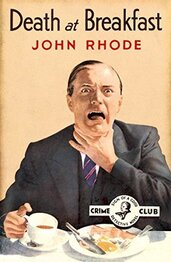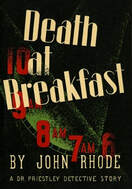
Adding to the padding is an interesting (if unnecessary to the plot) and detailed account of a 19th century European nicotine poisoning case. This true-crime anecdote certainly appears to be a source of inspiration to the author here, and he allows Jimmy Waghorn to expound for pages over similarities between the murder he is investigating and the poisoning of Gustave Fougnies by his sister and brother-in-law in 1850. Certainly the Comte and Comtesse de Bocarmé were less imaginative in their approach to murder – overpowering and forcing their victim to swallow the stuff – than Rhode’s resourceful villain in Death at Breakfast.
This was the first Dr. Priestley mystery I experienced as an audiobook, and John Rhode’s unadorned reportage style of storytelling makes for an easy listening experience. Many thanks to Anna M. of Germany, who brought the author’s titles on audiobook to my attention!
There was one aspect that may have been made more prominent because I was listening to a reader performing each character’s dialogue, but it is a common element of some Golden Age Detective fiction, and of Rhode’s books in particular. Superintendent Hanslet assumes the rather utilitarian role that many official police characters perform in these stories: he is very capable of collecting evidence and advancing theories, but his energy with these tasks is directly proportional to the limits of his thinking. (This must be so in order for the brilliant amateur detective to take the reins and deliver the solution before the plodding copper can.) The paradox here is that Rhode paints Hanslet as a man who, upon hearing that feline blood is found at the scene of a mighty fight inside a room, has a mind nimble enough to imagine a tussle with an escaped tiger may have occurred, but is not intuitive enough to think that a person may have used cat’s blood for the purposes of misdirection. It’s a strange tightrope walk between intelligence and ignorance, and I’m not sure that the author keeps his character convincingly in the air at all times.

 RSS Feed
RSS Feed